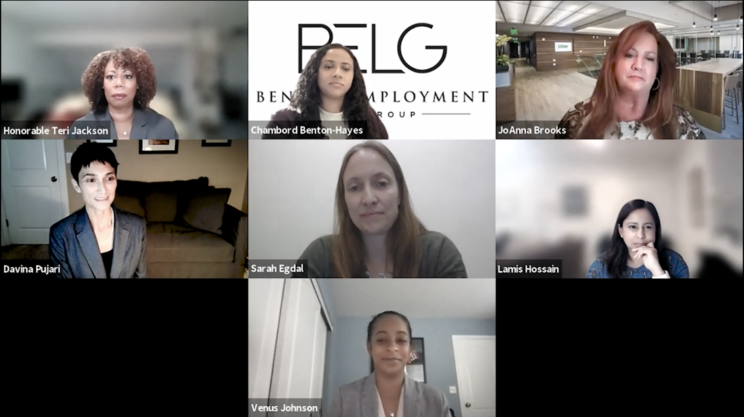
Event Recap
According to the State Bar of California’s First Annual Report Card on Diversity of California’s Legal Profession published on July 20, 2020, white attorneys comprise 68% of the 2019 California attorneys while people of color account for 32% of attorneys. Women constitute half of California’s adult population but account for 42% of California attorneys. The State Bar concludes “California’s legal profession remains predominantly white and male” in one of their Bar Briefs.
On Oct. 12, the Diversity and Inclusion Committee of the Barristers Club of the Bar Association of San Francisco, Black Women Lawyers Association of Northern California, and the Queen's Bench organized an empowering virtual panel discussion among women attorneys and judges from different sectors as they shared personal advice and stories from their first 10 years of practice. This fireside chat not only offers insights into the legal industry for young attorneys, but also creates a supportive network among female attorneys. This recap highlights several topics that focus on the dilemmas female legal professionals face on a regular basis.

Looking back on your career path, what do you wish you had done differently?
Davina Pujari, partner of Hanson Bridgett, opened the discussion with a big-picture question asking panelists what they wish they would’ve done differently in advancing their career. In the first round of discussion, panelists emphasized the importance of relationship building and self-advocacy. Judge Teri L. Jackson, presiding justice of California Court of Appeal, first explained the distinction between having an advocate and a mentor. A mentor can be someone who is within or outside of the legal profession, while an advocate is someone who is at the table where the decision is being made particularly about you. Other panelists supported the idea by encouraging young lawyers to start cultivating the different relationships early inside and outside the legal fields.
“Sometimes if you keep your nose down too much, you’ll miss out, especially in a government office… So make sure you’re networking… and genuinely maintaining those relationships… and seeking advice when you need it,” said Venus D. Johnson, Chief Deputy Attorney General of California Department of Justice.
In addition to finding an advocate, speakers stated how practicing self-advocacy is also crucial in career development. The Legal Director of Product of Uber Health, Lamis Hossain, shared a personal story of experiencing imposter syndrome due to her cultural baggage. “There’s a little bit of cultural baggage to celebrate your successes because you don’t want to attract negative attention.” Yet, she suggested “I’d tell my younger self: forget about all that, celebrate away. If you do a big deal, make sure everyone knows about it. It [the project]’s not going to be perfect, and that’s fine.”
Then, Hossain elaborated further with another piece of advice of caring less “being too invested in your career can actually hinder your success… by caring less, you’re probably caring just enough.” Stress and burnout are uniquely prevalent phenomena in the legal profession. Chambord Benton-Hayes, founder of Benton Employment Law Group, added that in order to have a long-term career, self-care has to be a priority.
[O]ver a period of time, there aren’t these neat little pockets that we can design and say, it’s going to be 50% here and 20% there, and I can just divide this all up. You know, the ball is going to drop. Just because the ball drops doesn’t mean the ball is broken, you just pick it up and keep moving. — Venus D. Johnson
Do you strive for work-life balance?
Expanding on the topic of self-care, the panel took a wider scope to discuss the concept of work-life balance. Pujari opened the conversation by sharing a quote by one of her trusted mentors. “I don’t try for balance. I think balance is an illusion and a myth that is unattainable; and it’s just one more thing that is resting on my shoulders that I can’t carry. And so I don’t try for balance, I try to show up where I’m needed in the moment that I’m needed in the way that I’m needed. Sometimes that’s going to be all work, sometimes that’s going to be all home.”
Many people find it difficult to achieve and maintain work-life balance, especially those in the high-stress legal profession. It’s a common condition that the feeling of remorse permeates when they are unable to maintain balance. The panel expressed that this is not just a piece of advice to their younger selves but a constant daily reminder to stop self-blaming while juggling different roles at work and home.
“[O]ver a period of time, there aren’t these neat little pockets that we can design and say, it’s going to be 50% here and 20% there, and I can just divide this all up. You know, the ball is going to drop,” said Johnson. “Just because the ball drops doesn’t mean the ball is broken, you just pick it up and keep moving.”
Sarah Egdal, General Counsel of MIXT, added that work-life balance is not a math problem because the equation is not going to balance out on both sides. “To me, balance is like a skill. But it’s not like a drop on one side and a drop on another side. It’s just your life, and you just have to handle what’s in front of you and what’s rising to the surface.”
Another piece of advice suggested by Pujari is to be selective about your daily tasks and create balance on your plate, which led to the next discussion of how to say yes or no to requests as a female attorney or judge.
How do you decide what to say yes and no to?
It’s hard for young attorneys to say no. However, a line needs to be drawn to avoid burnout. JoAnna Brooks, shareholder of Littler Mendelson, encouraged young lawyers to identify the career opportunities that work best for them based on their specialization or industry specialization where they wish to advance.
Besides the ambition of advancing their career, speakers shared a common approach of agreeing to be in leadership positions that can be beneficial for others. With their presence in a committee and/or participation in an event, they hope to motivate other people, especially women and people of color, to follow in their footsteps. It is an act of not only building community but also fostering diversity that reflects California’s society.
Since Sheryl Sandberg published her book Lean In in 2013, the concept of “lean in” has been developed into a motto, advocacy, or even social expectation on women at work in America. In recent years, media and critics started to review this concept from a different standpoint considering the role of persisting structured discrimination. Johnson pointed out a fundamental structural issue in the legal field, “for me, we’ve always been here, but the world just chose not to see us. We’ve been leaning in. We’ve been present. We’ve been at the table. We are starting our own law firms. We are justices. We are partners at law firms. We are general counsels. We have been leaning in and doing all the things.”
She suggested, “so it is time that we are recognized for what we have already contributed and to be accepted for what we currently are contributing. Don’t be afraid of your voice, use it. Don’t let conversations happen around you about you. Be present and participate in those conversations, and make sure you’re contributing your voice, so I am a ‘no, thank you’.”
From a diverse standpoint as a law firm leader, Benton-Hayes expressed that she has to get comfortable with saying ‘no’. She views saying ‘no’ as an opportunity to support someone else in the legal community. After rejecting a request, she provided a relevant resource to address people and clients’ immediate needs by connecting them with another colleague.
Imposter syndrome: what do you do to get back to the truth?
Imposter syndrome is a psychological experience of perceiving oneself as incompetent and phony to deserve what they had achieved. Simply speaking, it is an internal experience that one feels they don’t belong to where they are and they only got there through luck. It is prevalent in high achievers, especially among women, women of color and the LGBTQ community.
Judge Jackson shared that she grew up in an environment where she was told she shouldn’t, couldn’t, and was not qualified to be a lawyer due to her skin color. When one hears a rejection, the feeling of self-doubt that is one of the common signs of imposter syndrome can go through their mind, which results in overworking 10 times harder than others to prove their qualification. Speaking from experience, Judge Jackson immediately called to refrain from the theory of overworking. “I do not have to work 10 times harder than my colleagues because I want to impress them that I can write a great opinion, but I am working 10 times harder because Teri wants to write a good opinion.”
She also stated her philosophy of confronting her self-doubt, “we have to get past this imposter syndrome because we all deserve and we’re entitled, and we have something to bring to the profession.”
The panel then provided resources and tips for people who have been undergoing the imposter syndrome – talk to a mentor and advocate, find your confidence and values that show you matter, as well as keep a daily reminder that you can do this when encountering challenges.
For Johnson, knowing her value and responsibility has led her back to the truth. She shared that she found her value and confidence by representing and advocating victims, witnesses and community who weren’t present at the table when people were making decisions about them. “I think carrying them with me, that responsibility of being their advocate in communities that some folks will never interact with… and bring them to the table is really important, and that empowered me to feel more confident in who I was and who I am.”
To hear more tips and stories on how to deal with mean comments, discrimination, mansplaining and other situations, watch the full recording of the discussion.
For other event recordings:
Visit BASF's Vimeo: https://vimeo.com/sfbar/videos

